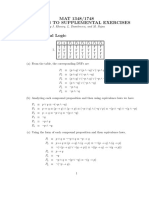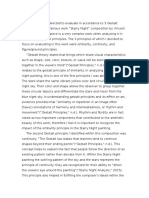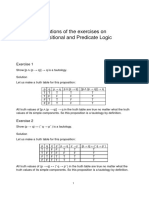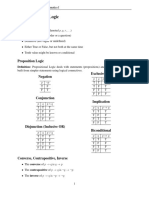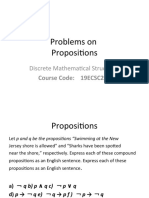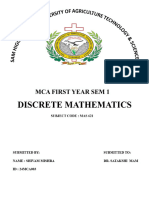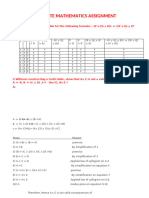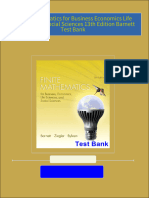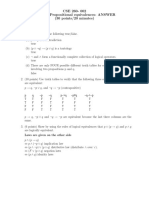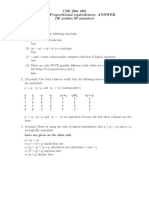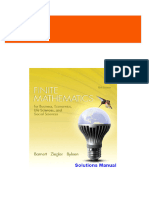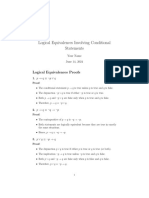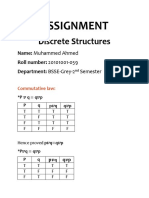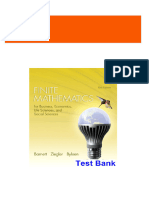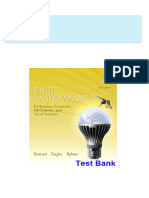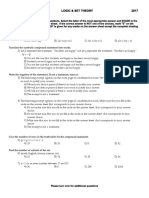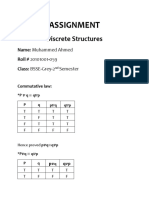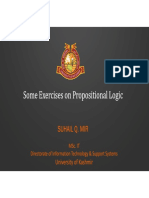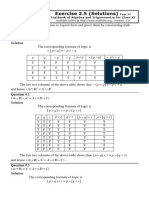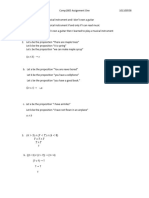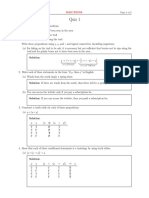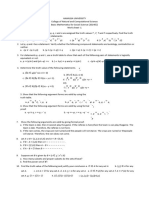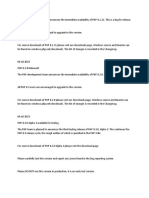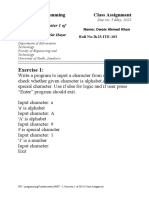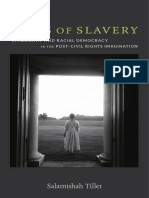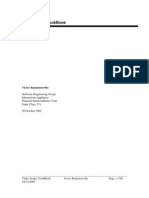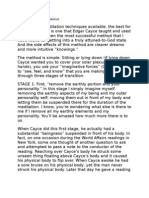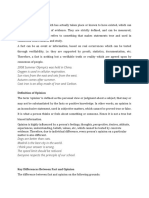DS Assignment
DS Assignment
Uploaded by
Owais KhanCopyright:
Available Formats
DS Assignment
DS Assignment
Uploaded by
Owais KhanOriginal Title
Copyright
Available Formats
Share this document
Did you find this document useful?
Is this content inappropriate?
Copyright:
Available Formats
DS Assignment
DS Assignment
Uploaded by
Owais KhanCopyright:
Available Formats
ITEC – 322: Discrete Structures Class Assignment 1
BS (IT) – I, Semester 1 of 2023 Due on: 2 May, 2023
Course Instructor: Dr. Abdul Waheed Mahesar Maximum Marks: 05
Department of Information Technology
Faculty of Engineering and Technology
University of Sindh, Jamshoro
Instructions:
Attempt All Questions. Please submit the assignment on due date with hand written
format.
Q#01. 10. Let p and q be the propositions “The election is decided” and “The votes have
been counted,” respectively. Express each of these compound propositions as an English
sentence.
a) ¬p
b) p ∨ q
c) ¬p ∧ q
d) q → p
e) ¬q → ¬p
f ) ¬p → ¬q
g) p ↔ q
h) ¬q ∨ (¬p ∧ q)
a) ¬ p : The election is not (yet) decided.
b) p ∨ q : The election is decided or the votes have been counted.
c) ¬ p∧q : The votes have been counted but the election is not (yet)
decided.
d) q → p : If the votes are counted then the election is decided.
e) ¬ q → ¬ p : The election is not decided unless the votes have
been counted.
f) ¬ p → ¬ q : The votes have not been counted unless the election
has been decided. This is equivalent to proposition d).
g) p ↔ q : The election is decided if and only if the votes have been
counted.
h) ¬ q ∨ (¬ p ∧ q) : The votes have not been counted, or they have
been counted but the election is not (yet) decided.
Q#02. Let p and q be the propositions p : It is below freezing. q : It is snowing. Write these
propositions using p and q and logical connectives (including negations).
a) It is below freezing and snowing.
b) It is below freezing but not snowing.
c) It is not below freezing and it is not snowing.
d) It is either snowing or below freezing (or both).
e) If it is below freezing, it is also snowing.
f ) Either it is below freezing or it is snowing, but it is not snowing if it is below freezing.
g) That it is below freezing is necessary and sufficient for it to be snowing.
ITEC –322 : Discrete Structures | BSIT – I, Semester 1 of 2023 | Class Assignment
a) It is below freezing and snowing. (p ∧ q)
b) It is below freezing but not snowing. (p ∧ ¬q)
c) It is not below freezing and it is not snowing. (¬p ∧ ¬q)
d) It is either snowing or below freezing (or both). (p ∨ q)
e) If it is below freezing, it is also snowing. (p → q)
f) Either it is below freezing or it is snowing, but it is not snowing if it is below freezing.
(p ∨ q) ∧ ¬(p ∧ q)
g) That it is below freezing is necessary and sufficient for it to be snowing. (p ↔ q)
Q#03. Let p, q, and r be the propositions p: You have the flu. q: You miss the final
examination. r : You pass the course. Express each of these propositions as an English
sentence.
a) p → q
b) ¬q ↔ r
c) q → ¬r
d) p ∨ q ∨ r
e) (p → ¬r) ∨ (q → ¬r)
f ) (p ∧ q) ∨ (¬q ∧ r)
a) If you have the flu, then you miss the final examination.
b) You do not miss the final examination if and only if you pass the course.
c) If you miss the final examination, then you do not pass the course.
d) You have the flu or you miss the final examination or you pass the course.
e) Either you do not pass the course if you have the flu or you do not pass the course if you
miss the final examination.
f) You have the flu and miss the final examination or you do not miss the final examination
and pass the course.
Q#04. Let p and q be the propositions p : You drive over 65 miles per hour. q : You get a
speeding ticket. Write these propositions using p and q and logical connectives (including
negations).
a) You do not drive over 65 miles per hour.
b) You drive over 65 miles per hour, but you do not get a speeding ticket.
c) You will get a speeding ticket if you drive over 65 miles per hour.
d) If you do not drive over 65 miles per hour, then you will not get a speeding ticket.
e) Driving over 65 miles per hour is sufficient for getting a speeding ticket.
a) ¬p
b) p ∧ ¬q
c) p → q
d) ¬p → ¬q
e) p → q
Q#05. Construct a truth table for each of these compound propositions.
a) p → ¬q
ITEC –322 : Discrete Structures | BSIT – I, Semester 1 of 2023 | Class Assignment
b) ¬p ↔ q
c) (p → q) ∨ (¬p → q)
d) (p → q) ∧ (¬p → q)
e) (p ↔ q) ∨ (¬p ↔ q)
f ) (¬p ↔ ¬q) ↔ (p ↔ q)
a) p → ¬q
p q ¬q p → ¬q
T T F F
T F T T
F T F T
F F T T
b) ¬p ↔ q
p q ¬p ¬p ↔ q
T T F T
T F F F
F T T F
F F T T
c) (p → q) ∨ (¬p → q)
p q (p → q) (¬p → q) (p → q) ∨ (¬p → q)
T T T T T
T F F F F
F T T T T
F F T T T
d) (p → q) ∧ (¬p → q)
p q (p → q) (¬p → q) (p → q) ∧ (¬p → q)
T T T T T
T F F T F
F T T T T
F F T T T
e) (p ↔ q) ∨ (¬p ↔ q)
p q ¬p (p ↔ q) (¬p ↔ q) (p ↔ q) ∨ (¬p ↔ q)
T T F T F T
T F F F T T
F T T F T T
F F T T F T
f) (¬p ↔ ¬q) ↔ (p ↔ q)
p q ¬p ¬q ¬p ↔ ¬q p↔q (¬p ↔ ¬q) ↔ (p ↔ q)
T T F F T T T
T F F T F F T
F T T F F F T
F F T T T T T
Q#06. Construct a truth table for each of these compound propositions.
ITEC –322 : Discrete Structures | BSIT – I, Semester 1 of 2023 | Class Assignment
a) (p ∨ q) ∨ r
b) (p ∨ q) ∧ r
c) (p ∧ q) ∨ r
d) (p ∧ q) ∧ r
e) (p ∨ q) ∧ ¬r
f ) (p ∧ q) ∨ ¬r
a) (p ∨ q) ∨ r
p q r p∨q (p ∨ q) ∨ r
T T T T T
T T F T T
T F T T T
T F F T T
F T T T T
F T F T T
F F T F T
F F F F F
b) (p ∨ q) ∧ r
p q r p∨q (p ∨ q) ∧ r
T T T T T
T T F T F
T F T T T
T F F T F
F T T T T
F T F T F
F F T F F
F F F F F
c) (p ∧ q) ∨ r
p q r p∧q (p ∧ q) ∨ r
T T T T T
T T F T T
T F T F T
T F F F F
F T T F T
F T F F F
F F T F T
F F F F F
d) (p ∧ q) ∧ r
p q r p∧q (p ∧ q) ∧ r
T T T T T
T T F T F
T F T F F
T F F F F
F T T F F
F T F F F
ITEC –322 : Discrete Structures | BSIT – I, Semester 1 of 2023 | Class Assignment
F F T F F
F F F F F
e) (p ∨ q) ∧ ¬r
p q r ¬r p∨q (p ∨ q) ∧ ¬r
T T T F T F
T T F T T T
T F T F T F
T F F T T T
F T T F T F
F T F T T T
F F T F F F
F F F T T T
f) (p ∧ q) ∨ ¬r
p q r ¬r p∧q (p ∧ q) ∨ ¬r
T T T F T T
T T F T T T
T F T F F F
T F F T F T
F T T F F F
F T F T F T
F F T F F
Q#07. Show that each of these conditional statements is a tautology by using truth tables.
a) (p ∧ q) → p
b) p → (p ∨ q)
c) ¬p → (p → q)
d) (p ∧ q) → (p → q)
e) ¬(p → q) → p
f ) ¬(p → q) → ¬q
a) (p ∧ q) → p
p q p∧q (p ∧ q) → p
T T T T
T F F T
F T F T
F F F T
b) p → (p ∨ q)
p q p ∨ q p → (p ∨ q)
T T T T
T F T T
ITEC –322 : Discrete Structures | BSIT – I, Semester 1 of 2023 | Class Assignment
F T T T
F F F T
c) ¬p → (p → q)
p q ¬p p → q ¬p → (p → q)
T T F T T
T F F F T
F T T T T
F F T T T
d) (p ∧ q) → (p → q)
p q p ∧ q p → q (p ∧ q) → (p → q)
T T T T T
T F F F T
F T F T T
F F F T T
e) ¬(p → q) → p
p q p→q ¬(p → q) ¬(p → q) → p
T T T F T
T F F T T
F T T F T
F F T T F
f) ¬(p → q) → ¬q
p q p→q ¬q ¬(p → q) ¬(p → q) → ¬q
T T T F F T
T F F T T T
F T T F F T
F F T T T T
Q#08. Show that each of these conditional statements is a tautology by using truth tables.
a) [¬p ∧ (p ∨ q)] → q
b) [(p → q) ∧ (q → r)] → (p → r)
c) [p ∧ (p → q)] → q
d) [(p ∨ q) ∧ (p → r) ∧ (q → r)] → r
a) [¬p ∧ (p ∨ q)] → q
p q ¬p p∨q ¬p ∧ (p ∨ q) [¬p ∧ (p ∨ q)] → q
T T F T F T
T F F T T F
F T T T T T
F F T F F T
b) [(p → q) ∧ (q → r)] → (p → r)
ITEC –322 : Discrete Structures | BSIT – I, Semester 1 of 2023 | Class Assignment
p q r p→q q→r (p → q) ∧ (q → r) [(p → q) ∧ (q → r)] → (p → r)
T T T T T T T
T T F T F F T
T F T F T T T
T F F F T T T
F T T T T T T
F T F T F F T
F F T T T T T
F F F T T T T
c) [p ∧ (p → q)] → q
p q p → q p ∧ (p → q) [p ∧ (p → q)] → q
T T T T T
T F F F T
F T T F T
F F T F T
d) [(p ∨ q) ∧ (p → r) ∧ (q → r)] → r
p q r p∨q p→r q→r (p ∨ q) ∧ (p → r) ∧ (q → r) [(p ∨ q) ∧ (p → r)
∧ ∧ (q → r)] → r
T T T T T T T T
T T F T F F F T
T F T T T T T T
T F F T F T F T
F T T T T T T T
F T F T T F F T
F F T F T T F T
F F F F T T F T
Q#09. Let P (x) be the statement “x spends more than five hours every weekday in class,”
where the domain for x consists of all students. Express each of these quantifications in
English.
a) ∃xP (x)
b) ∀xP (x)
c) ∃x ¬P (x)
d) ∀x ¬P (x)
a) ∃xP (x) There exists a student who spends more than five hours every weekday in class.
b) ∀xP (x) Every student spends more than five hours every weekday in class.
c) ∃x ¬P (x) There exists a student who does not spend more than five hours every weekday in
class.
d) ∀x ¬P (x) No student spends more than five hours every weekday in class
ITEC –322 : Discrete Structures | BSIT – I, Semester 1 of 2023 | Class Assignment
Q#10. Let N (x) be the statement “x has visited North Dakota,” where the domain consists of
the students in your school. Express each of these quantifications in English.
a) ∃xN (x)
b) ∀xN (x)
c) ¬∃xN (x)
d) ∃x¬N (x)
e) ¬∀xN (x)
f ) ∀x¬N (x)
a) ∃xN (x) There exists a student in your school who has visited North Dakota.
b) ∀xN (x) Every student in your school has visited North Dakota.
c) ¬∃xN (x) No student in your school has visited North Dakota.
d) ∃x¬N (x) There exists a student in your school who has not visited North Dakota.
e) ¬∀xN (x) Not every student in your school has visited North Dakota.
f ) ∀x¬N (x) No student in your school has visited North Dakota.
THE END
ITEC –322 : Discrete Structures | BSIT – I, Semester 1 of 2023 | Class Assignment
You might also like
- Book Solutions Discrete Mathematics and Its Applications Kenneth H RosenDocument37 pagesBook Solutions Discrete Mathematics and Its Applications Kenneth H RosenNguyệt Đoàn61% (28)
- Cabin Crew Guide To Ryanair E-LearningDocument11 pagesCabin Crew Guide To Ryanair E-LearningMonica BataragaNo ratings yet
- Aglc4 PDFDocument337 pagesAglc4 PDFjzdoogNo ratings yet
- AIA Layer StandardsDocument47 pagesAIA Layer StandardsseptiNo ratings yet
- Assignment 1 Logic AnswersDocument7 pagesAssignment 1 Logic Answersasseel alazaziNo ratings yet
- Lesson 6 Psy ArtDocument3 pagesLesson 6 Psy Artapi-352786741No ratings yet
- COMIA, JOHN LLOYD B - Exercises-No.1Document7 pagesCOMIA, JOHN LLOYD B - Exercises-No.1John Lloyd ComiaNo ratings yet
- Paña Exercises-No.1Document6 pagesPaña Exercises-No.1Micah PañaNo ratings yet
- Exercise 1Document7 pagesExercise 1CARLIN JOSH MENDOZANo ratings yet
- فارغ 3Document9 pagesفارغ 3raeiwwisNo ratings yet
- Discrete Mathematics and Its Applications - Kenneth Rosen (2012)Document4 pagesDiscrete Mathematics and Its Applications - Kenneth Rosen (2012)butt productionNo ratings yet
- CpE103 47094 02Document3 pagesCpE103 47094 02Jelaiza Thea FonteNo ratings yet
- Discrete Math Lab 2 With AnswerDocument12 pagesDiscrete Math Lab 2 With AnswerMizoo MahmoudNo ratings yet
- Mathematical Logic: Algebra and GeometryDocument9 pagesMathematical Logic: Algebra and GeometryPeterNo ratings yet
- CPT 317 - AI Week 7 PL FOL (Question and Answer)Document9 pagesCPT 317 - AI Week 7 PL FOL (Question and Answer)Mohamed ShaamNo ratings yet
- ¬ (ρ ∧ q) ¬p ∨ ¬q ρ q ¬ ρ ¬ q (ρ ∧ q) ¬ (ρ ∧ q) ¬p∨ ¬q: State & prove Demorgans law by using truth tableDocument2 pages¬ (ρ ∧ q) ¬p ∨ ¬q ρ q ¬ ρ ¬ q (ρ ∧ q) ¬ (ρ ∧ q) ¬p∨ ¬q: State & prove Demorgans law by using truth tableAnonymous YOMrtJJNo ratings yet
- Discrete Structure (Assignment)Document9 pagesDiscrete Structure (Assignment)kripal shresthaNo ratings yet
- 1.1 Propositional Logic: PropositionDocument5 pages1.1 Propositional Logic: PropositionNgoc DucNo ratings yet
- PropositionsDocument25 pagesPropositionsShantala GiraddiNo ratings yet
- 5 6282914577063612271Document7 pages5 6282914577063612271guddukashyap7244No ratings yet
- Solutions of The Exercises On Propositional and Predicate LogicDocument8 pagesSolutions of The Exercises On Propositional and Predicate LogicMartinho Moco OelNo ratings yet
- Rosela Rowell, Carlos Rodriguez, Mark Salpeter, Chet Michals, Sarah KiddDocument5 pagesRosela Rowell, Carlos Rodriguez, Mark Salpeter, Chet Michals, Sarah KiddRosela De Jesus RowellNo ratings yet
- P Is "1024 Bytes Is Known As 1MB" Q Is "A Computer Keyboard Is An Example of A Data Input Device"Document7 pagesP Is "1024 Bytes Is Known As 1MB" Q Is "A Computer Keyboard Is An Example of A Data Input Device"Joshio Padrón GonzálezNo ratings yet
- P Is "1024 Bytes Is Known As 1MB" Q Is "A Computer Keyboard Is An Example of A Data Input Device"Document7 pagesP Is "1024 Bytes Is Known As 1MB" Q Is "A Computer Keyboard Is An Example of A Data Input Device"Joshio Padrón GonzálezNo ratings yet
- Jules Rosatase - Activity #2Document6 pagesJules Rosatase - Activity #2Jules RosataseNo ratings yet
- Solution 1Document3 pagesSolution 1arpitadeshmukh113No ratings yet
- Assignment#1 SolvedDocument15 pagesAssignment#1 SolvediqraNo ratings yet
- DC Act 2Document1 pageDC Act 2Kristel BoralNo ratings yet
- Informatics College, Pokhara: MA4001NP Logic and Problem SolvingDocument16 pagesInformatics College, Pokhara: MA4001NP Logic and Problem SolvingAnjal MahatoNo ratings yet
- Construct The Truth Table For The Following FormulaDocument6 pagesConstruct The Truth Table For The Following Formularadhikakummari7No ratings yet
- Matematika DiskritDocument25 pagesMatematika DiskritjupriNo ratings yet
- Complete Download of Finite Mathematics for Business Economics Life Sciences and Social Sciences 13th Edition Barnett Test Bank Full Chapters in PDF DOCXDocument53 pagesComplete Download of Finite Mathematics for Business Economics Life Sciences and Social Sciences 13th Edition Barnett Test Bank Full Chapters in PDF DOCXramlolbasama40100% (4)
- CSE 260-002 QUIZ-2 - Propositional Equivalences - ANSWER (30 Points/20 Minutes)Document2 pagesCSE 260-002 QUIZ-2 - Propositional Equivalences - ANSWER (30 Points/20 Minutes)Joseph Jessie Sapinoso OñateNo ratings yet
- Logics PDFDocument2 pagesLogics PDFAdriana LimaNo ratings yet
- Download Study Resources for Finite Mathematics for Business Economics Life Sciences and Social Sciences 13th Edition Barnett Solutions ManualDocument24 pagesDownload Study Resources for Finite Mathematics for Business Economics Life Sciences and Social Sciences 13th Edition Barnett Solutions Manualkalttoyeky97100% (1)
- Immediate download College Mathematics for Business Economics Life Sciences and Social Sciences 13th Edition Barnett Solutions Manual all chaptersDocument51 pagesImmediate download College Mathematics for Business Economics Life Sciences and Social Sciences 13th Edition Barnett Solutions Manual all chaptersneiragollefn100% (3)
- Lecture 6 Class ExerciseDocument5 pagesLecture 6 Class ExercisePercy WongNo ratings yet
- Question Sheet 3Document13 pagesQuestion Sheet 3BAQUIDO ERA GRACE T.No ratings yet
- OutputDocument4 pagesOutputalaminmedicinecornerNo ratings yet
- Finite Mathematics For Business Economics Life Sciences and Social Sciences 13th Edition Barnett Solutions Manual 2024 Scribd Download Full ChaptersDocument51 pagesFinite Mathematics For Business Economics Life Sciences and Social Sciences 13th Edition Barnett Solutions Manual 2024 Scribd Download Full Chaptersrohlaaligwe100% (2)
- Proof of Equivalence LawsDocument7 pagesProof of Equivalence LawsMd AhmedNo ratings yet
- Unit 4 2010 AnswersDocument24 pagesUnit 4 2010 AnswersalicenuoliNo ratings yet
- Finite Mathematics for Business Economics Life Sciences and Social Sciences 13th Edition Barnett Test Bank all chapter instant downloadDocument41 pagesFinite Mathematics for Business Economics Life Sciences and Social Sciences 13th Edition Barnett Test Bank all chapter instant downloadkalttoyeky97100% (1)
- PDF Finite Mathematics For Business Economics Life Sciences and Social Sciences 13th Edition Barnett Test Bank DownloadDocument41 pagesPDF Finite Mathematics For Business Economics Life Sciences and Social Sciences 13th Edition Barnett Test Bank Downloadrohlaaligwe100% (2)
- 02 Propositional EquivalencesDocument24 pages02 Propositional EquivalenceshanderajatNo ratings yet
- DISCRETEDocument6 pagesDISCRETE7xcrdrdfb5No ratings yet
- Psu Math Relays Logic & Set Theory 2017Document6 pagesPsu Math Relays Logic & Set Theory 2017ARNAV ARNAVNo ratings yet
- MD Ahmed (059) DS-A1Document8 pagesMD Ahmed (059) DS-A1Md AhmedNo ratings yet
- Logical Equivalences: Tautology: Self Contradiction/ ContradictionDocument7 pagesLogical Equivalences: Tautology: Self Contradiction/ ContradictionAbdul BasitNo ratings yet
- Lecture Week 2 -Propositional LogicDocument38 pagesLecture Week 2 -Propositional Logicankit giriNo ratings yet
- Discrete Math Lab 1Document16 pagesDiscrete Math Lab 1Kareem AhmedNo ratings yet
- Some Exercises On Propositional Logic: Suhail Q. MirDocument14 pagesSome Exercises On Propositional Logic: Suhail Q. MirSuhail QadirNo ratings yet
- Chapter 3 Review (2014) ANSWER KEYDocument6 pagesChapter 3 Review (2014) ANSWER KEYChristine CamaraNo ratings yet
- Ex 2 5 FSC Part1 Ver3Document2 pagesEx 2 5 FSC Part1 Ver3zs98356No ratings yet
- Exercise 1.3: Higher Info Ma Ion Ence AcultyDocument5 pagesExercise 1.3: Higher Info Ma Ion Ence AcultymaryamNo ratings yet
- College Mathematics for Business Economics Life Sciences and Social Sciences 13th Edition Barnett Solutions Manual 2024 scribd download full chaptersDocument41 pagesCollege Mathematics for Business Economics Life Sciences and Social Sciences 13th Edition Barnett Solutions Manual 2024 scribd download full chaptersmuralynhap100% (8)
- Example 5:: Table 3: The Truth Table of (P Q) (P Q)Document3 pagesExample 5:: Table 3: The Truth Table of (P Q) (P Q)Sheryl BartolayNo ratings yet
- Shaheen 101100558 A1Document5 pagesShaheen 101100558 A1narutoshinobilegendsNo ratings yet
- Quiz1 Solutions PDFDocument2 pagesQuiz1 Solutions PDFNoel Murti100% (1)
- Discrete Mathematics: (COMP2121B)Document20 pagesDiscrete Mathematics: (COMP2121B)Brandon TayNo ratings yet
- Work Sheet 1Document12 pagesWork Sheet 1yeabtsegabereket091100% (1)
- Unit 1 Propositional and Predicate Logic: ApplicationDocument19 pagesUnit 1 Propositional and Predicate Logic: Applicationmuppalatarun143No ratings yet
- New Microsoft Word DocumentDocument11 pagesNew Microsoft Word DocumentOwais KhanNo ratings yet
- Hesco Online BillDocument1 pageHesco Online BillOwais KhanNo ratings yet
- Precentation MedicalDocument14 pagesPrecentation MedicalOwais KhanNo ratings yet
- IsyratDocument16 pagesIsyratOwais KhanNo ratings yet
- Problem of PakistanDocument7 pagesProblem of PakistanOwais KhanNo ratings yet
- Epanet Analysis of Unilag Water Distribution Network-LibreDocument16 pagesEpanet Analysis of Unilag Water Distribution Network-Libreamhosny64No ratings yet
- Founders of Thermodynamics and SuicideDocument13 pagesFounders of Thermodynamics and SuicideSubhas Chandra GangulyNo ratings yet
- VISIT BODØ - An All Year Round DestinationDocument11 pagesVISIT BODØ - An All Year Round Destinationviktor4555No ratings yet
- Marketing Information SystemDocument24 pagesMarketing Information SystemAlbert MervinNo ratings yet
- SQL DBA Resume FresherDocument3 pagesSQL DBA Resume FresherKris CunninghamNo ratings yet
- Sites of Slavery by Salamishah TilletDocument36 pagesSites of Slavery by Salamishah TilletDuke University PressNo ratings yet
- File Shakuntala Devi 1 1616398872Document5 pagesFile Shakuntala Devi 1 1616398872Asad MemonNo ratings yet
- CRJ270 Chapter1Document44 pagesCRJ270 Chapter1Lester Alvin AndalNo ratings yet
- Cooling Load CalculationDocument14 pagesCooling Load Calculationmnt6176No ratings yet
- Victor's Video Scaler Cook BookDocument30 pagesVictor's Video Scaler Cook BookgursimranjitsinghNo ratings yet
- Contamination in Pasir Gudang Area, Peninsular Malaysia: What Can We Learn From Kim Kim River Chemical Waste Contamination?Document4 pagesContamination in Pasir Gudang Area, Peninsular Malaysia: What Can We Learn From Kim Kim River Chemical Waste Contamination?Leow Chee Seng100% (1)
- Detailed Syllabus of UPSC Civil Services Mains Exam New PatternDocument4 pagesDetailed Syllabus of UPSC Civil Services Mains Exam New PatternHemanth KumarNo ratings yet
- FA 2 Syllabus 2023-24Document7 pagesFA 2 Syllabus 2023-24Nirmala GutamNo ratings yet
- Lesson 4Document8 pagesLesson 4Cristina Maquinto50% (2)
- (BS ISO 12913-1 - 2014) - Acoustics. Soundscape. Definition and Conceptual Framework PDFDocument16 pages(BS ISO 12913-1 - 2014) - Acoustics. Soundscape. Definition and Conceptual Framework PDFwilson ardilaNo ratings yet
- JavaDocument3 pagesJavaSasa LeungNo ratings yet
- Language Lab Study Materials: Beginner LevelDocument3 pagesLanguage Lab Study Materials: Beginner LevelSyam S PillaiNo ratings yet
- ANSWER 4 PART 1 and PART 2Document9 pagesANSWER 4 PART 1 and PART 2Rifat Tasfia OtriNo ratings yet
- Edgar CayceDocument4 pagesEdgar CayceJamal JohnsonNo ratings yet
- Sorbom, Dag (1974)Document11 pagesSorbom, Dag (1974)evgtsNo ratings yet
- Igcse Cam Math p3 分章Document654 pagesIgcse Cam Math p3 分章Louie SunNo ratings yet
- Investigating Mining Polluation and Plunder in Nueva VizcayaDocument4 pagesInvestigating Mining Polluation and Plunder in Nueva VizcayaNeil Bryan Lojo Pita100% (1)
- Chap17 CONFLICTS AND CULTURAL DIFFERENCESDocument21 pagesChap17 CONFLICTS AND CULTURAL DIFFERENCESwavesradioNo ratings yet
- Logical Facts and OpinionDocument2 pagesLogical Facts and OpinionHalimatNo ratings yet
- Abeka Themes in Literature ReviewDocument9 pagesAbeka Themes in Literature Reviewc5s4gda0100% (1)
- School Memorandum No. 002, S. 2024 Slac On Catch-Up FridaysDocument2 pagesSchool Memorandum No. 002, S. 2024 Slac On Catch-Up Fridaysjbcabulong123No ratings yet
